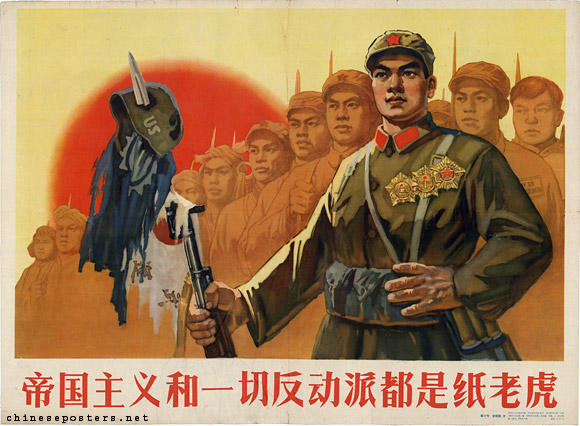More languages
More actions
No edit summary Tag: Visual edit |
PuzzledFox99 (talk | contribs) (In light of recent events) |
||
| (4 intermediate revisions by 3 users not shown) | |||
| Line 1: | Line 1: | ||
[[File:Korean anti-USA poster.png|thumb|[[Democratic People's Republic of Korea|Korean]] poster | [[File:Korean anti-USA poster.png|thumb|[[Democratic People's Republic of Korea|Korean]] poster captioned "[[Fatherland Liberation War|Repel]] the [[United States of America|U.S. invader]]!"]] | ||
[[File:Chinese anti-imperialist poster.png|thumb|"Imperialism and all [[Reactionary|reactionaries]] are all paper tigers"]] | [[File:Chinese anti-imperialist poster.png|thumb|Chinese poster captioned "Imperialism and all [[Reactionary|reactionaries]] are all paper tigers"]] | ||
'''Anti-imperialism''' in the context of [[Marxism-leninism|Marxism | '''Anti-imperialism''' in the context of [[Marxism-leninism|Marxism-Leninism]] is the opposition to states which meet [[Lenin]]'s definition of [[imperialism]] as outlined in his work, ''[[Library:Imperialism, the highest stage of capitalism|Imperialism, the highest stage of capitalism]]''. | ||
People who categorize themselves as anti-imperialists often state that they are opposed to [[colonialism]], colonial empires, [[hegemony]], imperialism and the territorial expansion of a country beyond its established borders.<ref>Richard Koebner and Helmut Schmidt, ''Imperialism: The Story and Significance of a Political Word, 1840–1960'' (2010).</ref> The phrase gained | Anti-imperialism supports [[self-determination]] and [[Anti-colonialism|anti-colonial]] movements even if they are not pro-[[Socialism|socialist]]: | ||
{{Quote|The struggle that the [[Amanullah Khan|Emir]] of [[Emirate of Afghanistan (1823–1926)|Afghanistan]] is waging for the independence of Afghanistan is objectively a [[revolutionary]] struggle, despite the [[monarchism|monarchist]] views of the Emir and his associates, for it weakens, disintegrates and undermines imperialism; whereas the struggle waged by such "desperate" democrats and "[[Social democracy|Socialists]]," "revolutionaries" and republicans as, for example, [[Alexander Kerensky|Kerensky]] and [[Irakli Tsereteli|Tsereteli]], [[Pierre Renaudel|Renaudel]] and [[Philipp Scheidemann|Scheidemann]], [[Viktor Chernov|Chernov]] and [[Fyodor Dan|Dan]], [[Arthur Henderson|Henderson]] and [[J. R. Clynes|Clynes]], during the imperialist war was a reactionary struggle, for its results was the embellishment, the strengthening, the victory, of imperialism. For the same reasons, the struggle that the [[Kingdom of Egypt (1922–1953)|Egyptians]] merchants and [[bourgeois]] intellectuals are waging for the independence of Egypt is objectively a revolutionary struggle, despite the bourgeois origin and bourgeois title of the leaders of Egyptian national movement, despite the fact that they are opposed to socialism.|[[Joseph Stalin]]|[[Library:The foundations of Leninism|Foundations of Leninism]]|1924}} | |||
People who categorize themselves as anti-imperialists often state that they are opposed to [[colonialism]], colonial empires, [[hegemony]], imperialism and the territorial expansion of a country beyond its established borders.<ref>Richard Koebner and Helmut Schmidt, ''Imperialism: The Story and Significance of a Political Word, 1840–1960'' (2010).</ref> They might not be [[Communism|communists]] either, but can be part of the [[national bourgeoisie]] or the non-socialist proletariat. The current governments of [[Iran]] and [[Russia]], for example, are anti-imperialist but are also opposed to communism. | |||
The phrase gained widespread use after the [[World War II|Second World War]] and at the onset of the [[Cold War]] as political movements in colonies of European powers promoted national sovereignty. Some anti-imperialist groups who opposed the [[American imperialism|United States]] supported the power of the [[Soviet Union]], such as in [[Guevarism]]. | |||
== See also == | == See also == | ||
| Line 9: | Line 15: | ||
* [[Anti-capitalism]] | * [[Anti-capitalism]] | ||
* [[Anti-colonialism]] | * [[Anti-colonialism]] | ||
* [[Anti-fascism]] | |||
* [[Anti-racism]] | * [[Anti-racism]] | ||
Latest revision as of 19:29, 9 December 2024


Anti-imperialism in the context of Marxism-Leninism is the opposition to states which meet Lenin's definition of imperialism as outlined in his work, Imperialism, the highest stage of capitalism.
Anti-imperialism supports self-determination and anti-colonial movements even if they are not pro-socialist:
The struggle that the Emir of Afghanistan is waging for the independence of Afghanistan is objectively a revolutionary struggle, despite the monarchist views of the Emir and his associates, for it weakens, disintegrates and undermines imperialism; whereas the struggle waged by such "desperate" democrats and "Socialists," "revolutionaries" and republicans as, for example, Kerensky and Tsereteli, Renaudel and Scheidemann, Chernov and Dan, Henderson and Clynes, during the imperialist war was a reactionary struggle, for its results was the embellishment, the strengthening, the victory, of imperialism. For the same reasons, the struggle that the Egyptians merchants and bourgeois intellectuals are waging for the independence of Egypt is objectively a revolutionary struggle, despite the bourgeois origin and bourgeois title of the leaders of Egyptian national movement, despite the fact that they are opposed to socialism.
— Joseph Stalin, Foundations of Leninism, 1924
People who categorize themselves as anti-imperialists often state that they are opposed to colonialism, colonial empires, hegemony, imperialism and the territorial expansion of a country beyond its established borders.[1] They might not be communists either, but can be part of the national bourgeoisie or the non-socialist proletariat. The current governments of Iran and Russia, for example, are anti-imperialist but are also opposed to communism.
The phrase gained widespread use after the Second World War and at the onset of the Cold War as political movements in colonies of European powers promoted national sovereignty. Some anti-imperialist groups who opposed the United States supported the power of the Soviet Union, such as in Guevarism.
See also[edit | edit source]
References[edit | edit source]
- ↑ Richard Koebner and Helmut Schmidt, Imperialism: The Story and Significance of a Political Word, 1840–1960 (2010).
